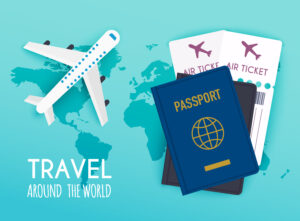
Study in Canada: 12 Checklists for International Students
Do you want to study in Canada?. Canada is consistently ranked as one of the best places in the world to live because it is friendly, beautiful, and inclusive. It’s also a popular choice for international students. Before planning to begin your study in Canada, there are a few things you should do, such as apply for a student visa, open a bank account, and secure housing.
International students come to Canada for a variety of reasons, including the high level of education, the diverse and accepting society, and access to attractive natural places. More than 721,000 international students studied in Canada in 2018. For many people, studying in Canada is also an excellent way to begin the process of becoming a permanent resident.
It’s never too early to start thinking about your study in Canada and checking off these twelve requirements for starting as an international student in Canada, whether you’re still in the planning stages or have already been accepted into a post-secondary institution here.
ALSO READ: Study in Canada: 10 Tips to Choose a Study Program for International Students
Study in Canada: 12 Checklist for International Students
As an international student, beginning your new collegiate career in Canada is an exciting time in your life. We’ve put together this checklist to help you get started in your chosen program. It covers the necessities you’ll need before you arrive in Canada.
1. Your International Passport
A passport is required for international traveling. If you don’t already have one, apply for one in your home country. If you do have a passport, ensure it’s up to date: you won’t be able to go internationally if it expires in less than six months.
A photocopy of any other official government identification from your home country should also be brought. This can include items such as:
a valid driver’s license.
a birth certificate
Once you arrive in Canada, you are responsible for ensuring your passport is up to date. Contact your home country’s consulate or embassy if you need to renew or extend your passport while in Canada.
2. An Acceptance Letter
A letter of acceptance will have been sent to you if you have been accepted to a designated Canadian post-secondary institution. An acceptance letter is also known as an offer letter or a letter of acceptance. In order to receive a study permit, you will need to produce your acceptance letter.
Some acceptance letters come with stipulations. This means that the applicant must meet certain criteria before beginning their major program of study in Canada. Completing ESL or FSL training is a prevalent condition.
3. Financial Standing
To obtain a study visa, you must demonstrate that you will be able to adequately fund your studies, including both tuition and living expenses. that is Proof of financial assistance.
All international students in Canada must show that they have a minimum annual income of $10,000 CAD ($833 CAD per month), with additional financial constraints if they are bringing family members with them. In the province of Quebec, you must have $11,000 CAD every year.
There are several ways to show your financial support:
You’ll need proof of a Canadian bank account in your name if you’ve transferred funds to Canada.
Guaranteed Investment Certificate from a Canadian banking institution (GIC)
Evidence of a student or education loan issued by a bank
Bank statements from the previous four months
A bank draft that can be exchanged into Canadian currency.
You’ll need to show documentation that you’ve paid full or part payment of your tuition
A letter from the person or school that is sponsoring you.
You must show proof of funding from within Canada if you have a scholarship or are enrolled in a Canadian-funded educational program.
4. The Study Permit
The document that authorizes you to stay in Canada and study is your study permit. It’s not the same as a student visa, which is the document that grants you permission to enter Canada. The application fee for a study permit is $150 CAD.
If you complete the first three steps of this checklist, you will have all of the documents you need to receive your study permit. In a nutshell, you’ll require:
- Acceptance evidence
- Identification proof (passport)
- Proof of financial assistance
You might also need:
- An explanation letter: This letter will aid the visa officer in understanding you and your objectives. It describes why you want to study in Canada, how the program would help you achieve your career goals, and how it will persuade the officer to accept your application.
- Quebec Acceptance Certificate(CAQ): If you want to study in Quebec, you’ll need a certificat d’acceptation du Québec (CAQ) from the Gouvernement du Québec. Your school can provide you with all of the information you need to apply for the CAQ.
- Custodian Declaration (only for minors): If you are a minor studying in Canada, you will need a custodian and must submit the Custodianship Declaration form with your application. It consists of two pages that must be notarized (confirmed by a notary) and then submitted with your application for a study permit.
- Other documents: All documents listed on your local visa office’s document checklist must be included in your application.
5. Accommodation
When you arrive at university, you’ll need to have a safe place to stay set up for you. If you have never visited the area before, finding a place to stay that is both reasonable and close to your school can be tough, but there are many options. Once you’ve been accepted to university, you should begin thinking about where you’ll live.
- On-campus student housing: Most post-secondary schools provide some form of on-campus student dormitories outfitted with basic furniture for overseas students. This is an excellent choice for first-year and second-year students who wish to be close to class. A communal dining hall with a paid food plan is available in many on-campus accommodation options. Some colleges have a strong demand for on-campus accommodation, so apply as soon as possible.
- Off-campus housing in an apartment or house: Off-campus housing is great for mature students who are comfortable cooking for themselves and are familiar with the surroundings and transit networks of their city in Canada. You can rent a one-bedroom apartment or save money by renting a single room in a shared apartment or house, depending on your budget.
- Considering whether a rental comes with or without furnishings, as well as the additional expense of furnishing a space.
- Keep in mind that listings for off-campus rentals aren’t always available until one or two months before the start date (places for September 1st move-in usually get posted in July or August).
- Rent is usually paid on a monthly basis, and costs vary widely from one place to the next.
- The most expensive rents are found in Canada’s main cities, such as Vancouver, Toronto, and Montreal (about $1000 CAD per month per room).
- To start looking for an off-campus rental, go to these websites:
Craigslist
Facebook Marketplace
Kijiji
Padmappers/Rentals.ca
- Homestay: A homestay is a sort of off-campus rental in which a student lives in the home of a host family. Typically, 1-3 meals are provided per day, and having your host family expose you to the area and make you feel more at home while you’re away at school might be beneficial. International students can find homestays in Canada through the Canada Homestay Network, HomeStay In, and YES Canada Homestay.
- Short-term furnished rentals: If you haven’t been able to obtain long-term housing for the school year, short-term furnished rentals for shorter periods may be an option (anywhere from a few days to a full four-month semester). Airbnb, Vrbo, Sublet.com, and Kijiji are all short-term rental websites that can assist you in finding affordable short-term rentals for any length of time.
6. Student Health Insurance
All international students in Canada must have basic and extended health insurance. The Canadian government’s health insurance policy does not cover international students. You may be able to receive private or provincial health insurance depending on where you live.
Provincial health insurance may cover the basics but excludes dental treatment, vision care, and other more specific health needs, depending on your jurisdiction. International students with correct study permits are eligible for a provincial health insurance card.
Private health insurance provides more customized coverage to fit your specific long-term needs. Some colleges and universities provide student health insurance policies that cover additional medical costs. Speak with your institution’s international students’ department to learn about your health insurance options.
7. A Copy of Your Medical Record/Prescriptions
Before you depart, request a copy of your medical records and immunization records from your doctor’s office. Any continuing medical issues or prescriptions should be documented so that you can continue to address them once you arrive in Canada to study. If you require medical assistance while at school, several Canadian institutions maintain a clinic on-campus or close by.
8. A Canadian Bank Account
During your study in Canada, You’ll need a bank that understands your needs as a newcomer and a student. RBC (Canada’s largest bank*) has been a warm and welcoming partner to newcomers for 150 years. It’s one of the reasons they’re so enthusiastic about everything we do here at Arrive.
It’s possible that your university has a branch on or near campus. See the RBC website’s branch locator for the latest up-to-date information and hours.
The following documents are required to open a student bank account with RBC:
- Your travel document
- Temporary Resident Visa (IMM 1442) or Student Permit (IMM 1442) (TRV)
- Enrollment confirmation (optional, but recommended; can be acquired from your university)
- Proof of residency or a Social Insurance Number (SIN) (optional, but recommended).
9. The Emergency Contact List is Required
Before you being your study in Canada. Your university may request that you provide a list of emergency contacts and their phone numbers in the case of an accident or emergency. Make a list of one or two-family or close friends from your home country to serve as emergency contacts. You may also want to include an emergency contact if you have close family or friends in Canada.
10. A Mobile Phone Plan
If you don’t already have one, you’ll need to upgrade to a Canadian cell phone plan. In general, phone plans in Canada are more expensive than in other countries. A cell phone plan’s price is determined by the services included in the package. A 5GB data package with talking and texting can cost anywhere between $60 and $100 CAD per month.
The price of a cell phone varies depending on the type of phone you need. A smartphone can easily cost more than $1000 CAD, yet a phone without internet connectivity can be purchased for less than $50 CAD. Some of the most popular Canadian phone plan providers include Rogers, Bell, Telus, Fido, Virgin, and Koodo.
11. A Laptop Computer or Tablet
In order to make your study in Canada less stressful, You’ll need to be able to access the internet via a personal device because most university courses now contain an online component. Using laptop computers or larger tablets, take notes, access course materials, study, and participate in online lectures. Your academic program may define your technological prerequisites. Consult your teacher or department’s technology advice before acquiring a laptop.
Depending on the model and features, new laptops and tablets can cost anywhere from $500 to $3,000 CAD. If you’re not sure which laptop is best for you, the staff at a technology store can guide you in the right direction.
12. Clothing for Winter
Last but not least, all international students will require winter clothing when they arrive in Canada. You might be surprised at how cold it can get here in the winter if you’ve never seen snow or experienced temperatures below -30 degrees Celsius.
Layering is crucial in chilly temperatures. Consider picking up a few of these products as the weather begins to cool in October or November:
Gloves, a hat, and a scarf are all recommended but not required.
Long-legged pants
Using thin layers Under sweaters, long-sleeve shirts
Warm sleeping apparel
Waterproof boots are ideal.
Socks with a lot of thickness
A top-notch winter coat
Bring a rain jacket and an umbrella if visiting rainier cities (e.g. Vancouver, Halifax, etc.)
A warm winter coat might cost anything from $150 to $300 CAD. Across Canada, Walmart, MEC, and SportChek, as well as local retailers, provide affordable winter coats. Long parkas, such as those made by Canada Goose, are popular and warm, but they may cost well over $1,000 CAD.
ALSO READ: 6 Reasons Why Studying in Ireland is the Best Option
You’ll be ready to study in Canada as an international student once you’ve checked off these twelve items on your checklist. We’re here to support you every step of the way as you make the decision to study abroad. Contact us by visiting our website, www.silvercloudtravelsng.com today.






